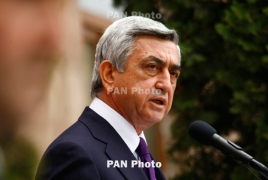
War can break out at any moment in the Caucasus flashpoint of Nagorno Karabakh and there’s little prospect of talks to resolve the conflict, the President of Armenia said, according to Bloomberg.
A Russian-brokered truce may not be enough to prevent fighting on an even larger scale after four days of war between Azeris and Armenians this month that involved several hundred tanks and 30,000 artillery rounds, Serzh Sargsyan said in an interview Saturday, April 23 at the presidential residence in the Armenian capital, Yerevan.
“It’s unreasonable for Armenia to return to peace talks with Azerbaijan over the territory without security guarantees because the situation is entirely different now,” he said. “On the one hand we’d be talking somewhere while, on the other, military officials would be engaging in war here to try to settle the conflict.”
Amid intense international diplomacy to avert a full-scale war, Sargsyan held talks with Russian Foreign Minister Sergei Lavrov in Yerevan on Friday. Lavrov told Azeri President Ilham Aliyev at talks in Baku on April 6 that Russia has proposals for resolving the conflict.
“Lavrov didn’t bring any new proposals because he realizes very well that it doesn’t make sense to talk about negotiations immediately after a four-day war,” Sargsyan said, according to Bloomberg.
Sargsyan, who’s a former military commander from Nagorno Karabakh, acknowledged publicly that Armenians lost some territory in the fighting.
“Azeri troops took very small pieces of land in the north and south of the contact line that had no strategic importance for Armenian forces, who didn’t try to reclaim them to avoid additional losses of life,” he said.
While the chief of the defense staff in Moscow mediated the ceasefire talks, there’s no place for Russian peacekeepers in the conflict zone to separate the two sides, Sargsyan said.
“While talk of Russian forces being deployed wasn’t entirely without grounds in previous peace negotiations, “I don’t see any such opportunity” now, he said.
“If there are no negotiations, how can Russian forces appear in Karabakh or between Azeri and Karabakh forces?” Sargsyan said. Russia’s pursuing a balanced policy between Armenia and Azerbaijan while seeking to avert large-scale military conflict, he said.
Flush with cash before the collapse in crude prices, oil-rich Azerbaijan boosted military spending 10-fold over the last decade to as much as $4.8 billion last year, according to authorities in Baku, more than Armenia’s entire state budget. Armenia’s defense budget rose threefold over the same period to $447 million, according to the Stockholm International Peace Research Institute.
Sargysan said Russian, U.S. and French mediators from the Organization for Security and Cooperation in Europe must put in place confidence-building measures before any new peace talks, and particularly an investigation mechanism for violations of the ceasefire that would pinpoint exactly which party was responsible.
“Armenia also requires assurances that these kinds of violations will not happen again,” he said.
The president disclosed that he’d been willing to withdraw Armenian forces from five districts of Azerbaijan and allow in peacekeepers as part of 2011 negotiations with Aliyev in the Russian city of Kazan. The Russian, U.S. and French presidents urged both leaders to resolve the conflict by signing the agreement, which would also have postponed a final decision on Nagorno Karabakh’s status, but Aliyev refused, Sargsyan said.
“That was the time when Azerbaijan was enriching itself with oil money and talking about the size of its military budget,” Sargsyan said of the failed 2011 talks. “What took place now should have been expected.”
The parties to the Karabakh conflict agreed on a bilateral cessation of fire along the contact line which came into force at midday, April 5.
On the night of April 1-2, Azerbaijani armed forces initiated overt offensive operations in the southern, southeastern and northeastern directions of the line of contact with Nagorno Karabakh.
The Armenian side has suffered 78 combat and 15 non-combat losses.
The Azerbaijani side has lost 26 tanks and 4 infantry fighting vehicles, as well as 1 BM-21 Grad multipl e rocket launcher, 1 engineering vehicle, 2 military helicopters and 14 unmanned aerial vehicles. The Azerbaijani side has admitted the loss of 31 fighters, 1 helicopter and 1 unmanned drone, whereas the Armenian side's photo and video materials show dozens of killed Azerbaijani troops, 1 helicopter and 3 UAVs. Opposition media outlets, however, reported on the death of 95 Azerbaijani soldiers, stating that 39 more have been wounded. According to Karabakh authorities, 300 Azerbaijani soldiers were killed in clashes.
14 Karabakh tanks were also neutralized.
The parties to the conflict agreed on a bilateral cessation of fire along the contact line which came into force at midday, April 5.

